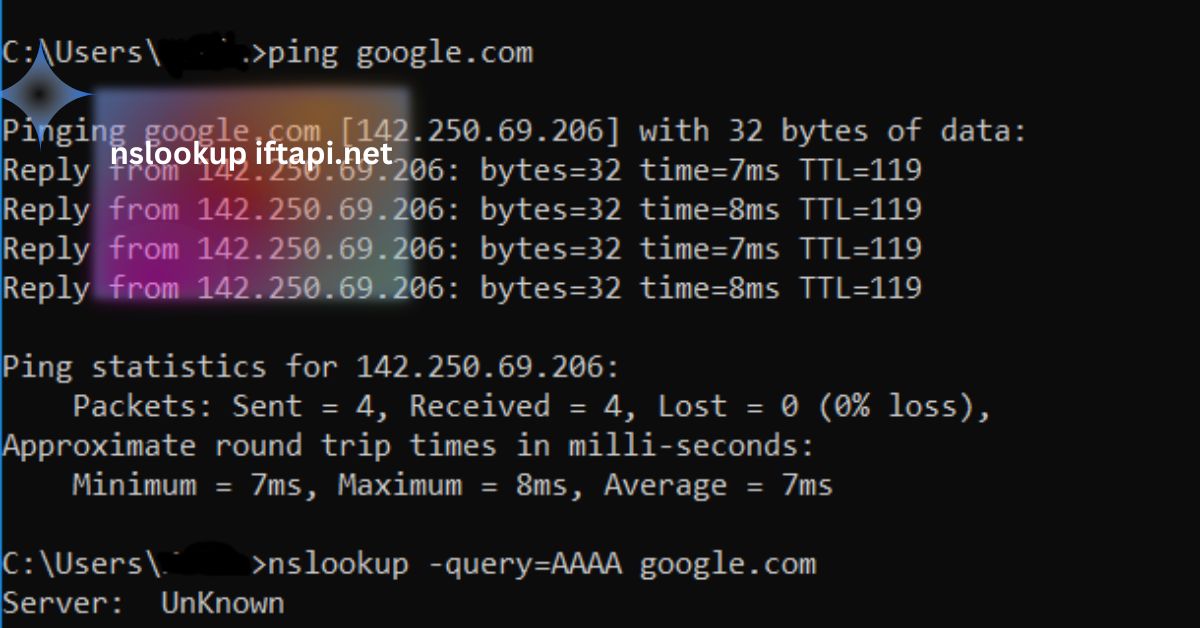Unveiling the Power of nslookup iftapi.net: A Deep Dive into Network Diagnostics
In today’s interconnected digital landscape, understanding and troubleshooting network issues has become increasingly crucial.
Among the various tools available to system administrators and network enthusiasts, nslookup iftapi.net stands out as a powerful command for diagnosing Domain Name System (DNS) related problems.
This article will explore the intricacies of this command, its applications, and its significance in maintaining a robust network infrastructure.
Understanding nslookup: The Network Administrator’s Swiss Army Knife
What is nslookup?
nslookup, short for “Name Server Lookup,” is a command-line tool used to query DNS servers. It’s an essential utility for network administrators and IT professionals, providing valuable information about domain names and their corresponding IP addresses.
The Anatomy of the nslookup iftapi.net Command
When you run nslookup iftapi.net, you’re essentially asking your DNS server to provide information about the domain “iftapi.net”. This command can reveal crucial details such as:
- IP addresses associated with the domain
- Authoritative name servers
- Mail exchanger records
- Canonical names (CNAME records)
The Significance of iftapi.net in Network Diagnostics
Decoding iftapi.net
iftapi.net is not just a random domain used in our example. It represents a broader concept in network monitoring and analysis. The “ift” in iftapi could stand for “Internet Flow Technology,” hinting at its potential role in network traffic analysis.
Connecting the Dots: nslookup and iftapi.net
By using nslookup on iftapi.net, network administrators can gain insights into:
- The hosting infrastructure of network monitoring tools
- Potential integration points for traffic analysis systems
- The geographical distribution of network analysis servers
Practical Applications of nslookup iftapi.net
Network Troubleshooting
Using nslookup iftapi.net can help identify issues such as:
- DNS resolution problems
- Misconfigurations in DNS records
- Potential security vulnerabilities related to DNS
Performance Optimization
By analyzing the results of nslookup iftapi.net, administrators can:
- Evaluate the responsiveness of DNS servers
- Identify opportunities for DNS caching improvements
- Assess the need for additional DNS servers or load balancing
Security Auditing
The nslookup iftapi.net command can be a valuable tool in security audits by:
- Revealing unexpected DNS entries that could indicate a compromise
- Identifying potential DNS spoofing attempts
- Verifying the integrity of DNS records
Advanced Techniques: Leveraging nslookup iftapi.net for Comprehensive Network Analysis
Combining nslookup with Other Network Tools
To maximize the benefits of nslookup iftapi.net, consider integrating it with other network diagnostic tools such as:
- ping: To test connectivity and latency
- traceroute: To map the path of network packets
- dig: For more detailed DNS information
Scripting and Automation
For large-scale network management, automating nslookup iftapi.net queries can be invaluable. Consider:
- Creating shell scripts for batch DNS queries
- Integrating nslookup results into network monitoring dashboards
- Developing custom alerting systems based on nslookup outputs
The Evolution of Network Diagnostics: From nslookup to Modern Solutions
Historical Context
The journey from simple command-line tools to sophisticated network analysis platforms showcases the evolution of IT infrastructure management. nslookup iftapi.net represents a foundational step in this journey.
Current Trends in Network Diagnostics
While nslookup iftapi.net remains relevant, modern network diagnostics have expanded to include:
- AI-driven network analysis tools
- Cloud-based monitoring solutions
- Integrated security and performance management platforms
The Future of Network Troubleshooting
As we look ahead, we can anticipate:
- More sophisticated DNS-based security measures
- Integration of blockchain technology in DNS management
- Enhanced predictive analytics for network issues
Best Practices for Using nslookup iftapi.net
Ensuring Accuracy
To get the most reliable results from nslookup iftapi.net:
- Use multiple DNS servers for verification
- Be aware of DNS caching effects
- Consider the Time-to-Live (TTL) values of DNS records
Security Considerations
When using nslookup iftapi.net, keep in mind:
- The potential for information leakage through DNS queries
- The importance of using trusted DNS servers
- The role of DNSSEC in enhancing DNS security
Documentation and Reporting
Maintain thorough records of your nslookup iftapi.net queries:
- Log all queries and results
- Create standardized reporting templates
- Use version control for any scripts involving nslookup
Case Studies: Real-World Applications of nslookup iftapi.net
Scenario 1: Troubleshooting a Global CDN
A major content delivery network used nslookup iftapi.net to diagnose inconsistencies in content distribution across different geographical regions.
Scenario 2: Identifying a Security Breach
A financial institution’s security team leveraged nslookup iftapi.net to uncover unauthorized DNS changes, leading to the discovery of a sophisticated phishing attempt.
Scenario 3: Optimizing a Multi-Cloud Environment
A tech startup used nslookup iftapi.net in conjunction with other tools to optimize their multi-cloud architecture, resulting in significant performance improvements and cost savings.
Comparative Analysis: nslookup iftapi.net vs. Alternative Tools
nslookup vs. dig
While both tools query DNS servers, dig often provides more detailed output and has more advanced features.
nslookup vs. host
The host command is simpler and often faster for basic DNS queries, but nslookup offers more flexibility for interactive use.
nslookup vs. Graphical DNS Tools
GUI-based DNS tools may be more user-friendly but often lack the scriptability and efficiency of command-line tools like nslookup.
Educational Resources: Mastering nslookup iftapi.net
Online Tutorials and Courses
- Network+ Certification courses often cover nslookup extensively
- Platform-specific tutorials (Windows, Linux, macOS) for nslookup usage
- Advanced DNS management courses that include nslookup as a key tool
Books and Publications
- “DNS and BIND” by Cricket Liu
- “Network Warrior” by Gary A. Donahue
- “The TCP/IP Guide” by Charles M. Kozierok
Community Resources
- Stack Overflow’s networking communities
- Reddit’s r/sysadmin and r/networking subreddits
- Vendor-specific forums (Cisco, Juniper, etc.)
Frequently Asked Questions
What is the primary purpose of the nslookup iftapi.net command?
The primary purpose of nslookup iftapi.net is to query DNS servers for information about the domain iftapi.net, including its IP addresses, name servers, and other DNS records.
How does nslookup differ from ping when troubleshooting network issues?
While ping tests connectivity and measures round-trip time to a host, nslookup specifically queries DNS servers for domain information. Ping uses ICMP, whereas nslookup uses DNS protocols.
Can nslookup iftapi.net be used to detect DNS spoofing?
Yes, by comparing the results of nslookup iftapi.net from different DNS servers or locations, you can potentially identify inconsistencies that might indicate DNS spoofing.
Is nslookup iftapi.net platform-specific?
No, nslookup is available on various operating systems including Windows, Linux, and macOS, making it a versatile tool for cross-platform network diagnostics.
How can I automate nslookup iftapi.net queries for regular monitoring?
You can create shell scripts or use scheduling tools like cron (on Unix-based systems) or Task Scheduler (on Windows) to automate regular nslookup iftapi.net queries and log the results.
What information can nslookup iftapi.net provide that’s not available through a web browser?
nslookup can reveal detailed DNS information such as TTL values, all associated IP addresses, and authoritative name servers, which are not typically visible through a web browser.
How does DNSSEC impact the results of nslookup iftapi.net?
When DNSSEC is enabled, nslookup iftapi.net may provide additional security-related information, such as RRSIG records, which validate the authenticity of DNS responses.
Can nslookup iftapi.net help in load balancing configuration?
Yes, by revealing multiple A records for iftapi.net, nslookup can help verify that DNS round-robin or other DNS-based load balancing techniques are correctly configured.
How frequently should I run nslookup iftapi.net as part of routine network maintenance?
The frequency depends on your specific needs, but for critical services, running nslookup iftapi.net daily or even hourly can help quickly identify DNS-related issues.
Are there any security risks associated with using nslookup iftapi.net?
While nslookup itself is safe, be aware that frequent queries to external DNS servers might be logged and could potentially reveal information about your network structure or monitoring practices.
Read more:
- Discount Codes ttweakairline by TravelTweaks: Unlock Savings on Your Next Flight
- usar livros mágicos em lonarp: A Comprehensive Guide
- Everything You Need to Know About the Phone Number 8325103215






